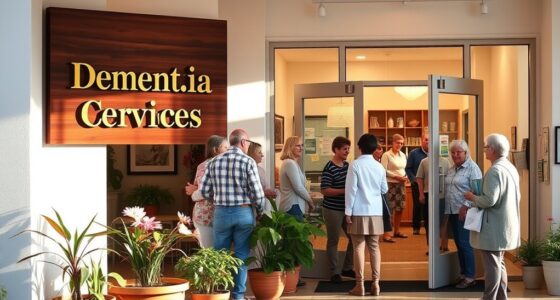If you're caring for a loved one, knowing essential resources can make a big difference. Start by evaluating your needs, from nutrition to transportation. Check out community care options like meal programs and caregiver support groups. Use task management tools to stay organized and consider medication management solutions to simplify routines. Don't forget emotional support networks for yourself. Each resource can lighten your load, and there's even more to discover to enhance your caregiving journey.
Key Takeaways
- Utilize Area Agencies on Aging for tailored services and support specific to your community's needs.
- Explore caregiver support programs for emotional guidance and practical resources.
- Engage in community meal programs and Meals on Wheels for nutritious meal delivery.
- Investigate accessible transportation options, including paratransit services for seniors and individuals with disabilities.
- Access educational resources and training materials to enhance caregiving skills and knowledge.
Assessing Needs and Preferences

How can you effectively assess the needs and preferences of your loved one for independent living? Start by evaluating essential areas like nutrition, bathing, and transportation, while anticipating future care requirements based on health conditions.
It's vital to identify family members responsible for caregiving and establish arrangements to support these roles.
Don't forget to examine financial resources to determine the ability to pay for support services, including insurance coverage options.
Take note of your loved one's preferences regarding caregiver characteristics, such as gender and language, to guarantee comfort and effective communication.
Documenting and communicating these needs, preferences, and resources will enhance the overall caregiving experience and facilitate smoother coordination of care for your loved one.
Community Care Options and Resources

As you navigate the complexities of caregiving, exploring community care options and resources can greatly ease the burden. You'll find invaluable support through caregiver support programs and local resources tailored to seniors' needs. Area Agencies on Aging (AAA) are excellent starting points, connecting you with care management services and emotional support. Respite care offers temporary relief, allowing you to recharge while ensuring your loved one receives quality attention.
Here's a quick reference for community resources:
| Resource Type | Description | Contact |
|---|---|---|
| Caregiver Support Programs | Offers guidance and counseling | Local Caregiver Center |
| Area Agencies on Aging | Connects families to essential services | AAA Local Office |
| Respite Care Services | Provides temporary caregiver relief | Respite Care Provider List |
Nutrition and Meal Programs

Nutrition plays a vital role in the well-being of those you care for, and various meal programs can help meet these needs. Community meal programs offer group meals at local centers for minimal fees, promoting social interaction while providing essential nutrition.
For homebound individuals, services like Meals on Wheels deliver nutritious meals directly to their door, ensuring safety checks for added peace of mind. Many of these meal programs use a sliding scale fee structure, making them accessible based on income.
You can also arrange weekend food supplies for those receiving weekday deliveries, ensuring continuous nutrition. By utilizing these resources, you not only support their nutritional needs but also alleviate the burden of meal preparation, enhancing the overall quality of life for both caregivers and care recipients.
Transportation and Care Services

When it comes to transportation and care services, you've got options that can make a real difference in your caregiving journey.
Accessible transportation solutions, like paratransit, help guarantee your loved ones can maintain their independence, while respite and adult day care services provide you with the much-needed support and relief.
Understanding these resources can ease the burden and enhance the overall well-being of both you and those you care for.
Accessible Transportation Options
Accessible transportation options play an essential role in enhancing the mobility of individuals with disabilities, guaranteeing they can engage fully with their communities.
Many local resources, including your Area Agency on Aging, can help you navigate available paratransit services mandated by the Americans with Disabilities Act. These services provide safe and efficient travel for individuals with disabilities.
Additionally, communities often offer discounted taxi and ride-sharing services designed specifically for those who may not use traditional transportation methods.
Adult day care services frequently include transportation assistance, allowing participants to access social activities and health services without barriers.
Respite Care Services
Respite care services offer families an essential lifeline, providing temporary relief for caregivers while ensuring their loved ones receive quality care.
These services can greatly ease the burdens of caregiving by offering:
- Professional home care that meets specific caregiving needs
- Transportation services that enhance mobility, including wheelchair-accessible options
- Opportunities for socialization and meals, improving mental well-being
- Support from local Area Agencies on Aging to find the right respite care options
Adult Day Care
For caregivers seeking additional support, adult day care services can be a valuable resource. These programs provide a structured environment for older adults, offering socialization, meals, and health services during the day.
You can take advantage of transportation services that help participants get to and from the facility, which is especially beneficial for those with mobility challenges. Many centers also cater to specific conditions like dementia or Alzheimer's, ensuring tailored care.
Engaging activities promote cognitive stimulation and physical health, reducing isolation. Additionally, adult day care often comes at a nominal fee, with financial assistance available through Medicaid or local Area Agencies on Aging, making it an affordable option for families in need of caregiver support groups.
Support Resources and Communication

You're not alone, and tapping into these resources can make a world of difference.
Consider these vital support options:
- Support groups for people facing similar challenges
- Online support groups that connect you with others, no matter where you are
- The Family Caregiver Alliance (FCA), offering diverse resources and multilingual support
- Employee assistance programs that provide counseling and resource locating services
Additionally, engaging in activities such as pet therapy can enhance emotional well-being for both caregivers and those they care for. Seeking out financial assistance programs for elderly care can also alleviate some of the burden on families. Understanding foster parent pay can provide insight into the financial support available for those caring for children in need.
Health Platforms for Care Coordination

As you navigate the complexities of caregiving, utilizing health platforms can greatly enhance care coordination.
These platforms, like CaringBridge, centralize updates and information, ensuring all caregivers have access to the same details. By reducing miscommunication and improving team coordination, you can effectively delegate tasks and schedule caregiver shifts.
Many health platforms also offer emotional support features, fostering a community where caregivers can share experiences and challenges. Additionally, these platforms can help caregivers stay informed about advance directives, which can guide critical medical decisions when necessary. Engaging in unique culinary experiences can also provide caregivers a much-needed break and a way to recharge.
With integrated digital care calendars, you can easily coordinate medical appointments and care routines, ensuring everyone is aware of their responsibilities.
Plus, task management tools help you organize and prioritize tasks, set reminders for medication, and track progress as care needs evolve. Additionally, some platforms provide insights into best parenting books for discipline, equipping caregivers with effective strategies for managing various situations.
Embrace these resources to streamline your caregiving journey.
Task Management Systems for Caregivers

Effective task management systems are essential for caregivers juggling multiple responsibilities. These tools help you organize and prioritize tasks, enhancing efficiency and guaranteeing urgent needs are addressed.
- Reduce caregiver burnout by sharing responsibilities
- Keep track of activities of daily living effortlessly
- Set reminders for medication management and appointments
- Adapt as care recipients' needs change
Digital platforms like Trello or Todoist allow you to coordinate schedules and delegate tasks among family members, promoting shared responsibility in your caregiving journey. Additionally, it's important to understand the unique emotional needs of those you care for to provide tailored support and enhance overall well-being. Creating a comfortable home environment can also significantly improve the quality of life for seniors, making it easier for caregivers to manage their tasks effectively and ensuring that their emotional and spiritual needs are met during this crucial time of end-of-life care.
Medication Management Tools

When it comes to managing medications, staying organized is key.
You can use automated dispensing solutions to guarantee your loved ones get their doses on time, while pill organizers help you keep track of when each medication should be taken.
Additionally, tracking medication history can help you avoid potential complications at doctor visits.
Organizing Medications Effectively
Organizing medications effectively can be a game changer for caregivers and their loved ones. By implementing proper medication management tools, you can greatly reduce medication errors and guarantee your loved ones meet their medical needs.
Here are some strategies to help:
- Use pill organizers to categorize medications by day and time.
- Try mobile apps to track dosages, refill dates, and doctor instructions.
- Implement automated pill dispensers for timed dispensing and reminders.
- Keep a record of allergies and medication history for emergencies.
Additionally, consulting a veterinarian about any potential interactions between prescribed medications and other substances can further enhance safety. These methods not only alleviate confusion but also enhance the safety and well-being of those with chronic health conditions.
Automated Dispensing Solutions
How can automated dispensing solutions transform your medication management? These tools, like automated pill dispensers, help you guarantee timely dispensing of medications, minimizing missed doses. They often include reminder systems that alert users when it's time to take their meds, enhancing adherence. Additionally, many feature locking mechanisms to prevent misuse, guaranteeing safety for seniors in living communities. Utilizing such tools can significantly improve respiratory health by ensuring timely medication for conditions like asthma.
| Feature | Benefits | Ideal For |
|---|---|---|
| Timed Dispensing | Reduces missed doses | Caregivers managing schedules |
| Reminder Systems | Improves adherence | Seniors needing prompts |
| Locking Mechanisms | Prevents overdoses | Families concerned about safety |
| Programmable Schedules | Manages complex regimens | Caregivers with multiple prescriptions |
These solutions notably boost health and well-being for both caregivers and those they support.
Tracking Medication History
Many caregivers find that tracking medication history is crucial for ensuring proper health management. By utilizing medication management tools, you can greatly improve health outcomes for your loved ones.
Here are some key benefits you can expect:
- Enhanced adherence to medication regimens
- Reduced risk of missed doses and medication errors
- Essential information readily available for emergency care
- Informed medical decisions based on accurate records
Tools like automated pill dispensers, medication tracking apps, and pill organizers help you stay on top of complex schedules.
These resources maintain records of allergies and medication history, ensuring you're prepared for any situation. By prioritizing tracking medication history, you empower yourself to provide the best possible care for your family.
Emotional Support Resources for Caregivers

While caregiving can be incredibly rewarding, it often comes with emotional challenges that can feel overwhelming. That's why seeking emotional support is essential.
Resources like the Family Caregiver Alliance offer support groups where you can connect with other caregivers, sharing experiences that foster a sense of community.
Platforms such as ALZConnected provide important emotional support for those caring for individuals with dementia, allowing you to bond with others who understand your journey.
Additionally, local Area Agencies on Aging can connect you to community resources designed to enhance your mental health and well-being.
Online forums and helplines also offer immediate assistance, ensuring you never face your challenges alone.
Engaging in these resources can help you navigate emotional ups and downs of caregiving, similar to how survivors of narcissistic abuse find support in shared experiences.
Local and Online Support Services

When you're managing the challenges of caregiving, local and online support services can make a significant difference.
Area Agencies on Aging offer resources tailored to your needs, while online platforms provide flexibility and access to valuable information.
Connecting with local caregiver networks also helps you find community support and share experiences with others in similar situations.
Area Agencies on Aging
Area Agencies on Aging (AAAs) serve as crucial lifelines for families traversing the challenges of caregiving for older adults.
These local organizations provide essential services tailored to your community's needs, helping family caregivers navigate the complexities of care. You can find support through:
- Meal delivery services
- Senior centers offering social activities
- Caregiver support groups for shared experiences
- Assistance with public benefits like Medicaid and Medicare
With personalized support, AAAs enhance the quality of life for seniors and their families.
They guarantee you're not alone in this journey, connecting you with resources that can make a significant difference.
Don't hesitate to reach out and explore the wealth of services available to you through your local Area Agency on Aging.
Online Support Platforms
Steering the caregiving journey can feel overwhelming, but online support platforms offer an essential lifeline. These resources are available to help you navigate your caregiving responsibilities.
For instance, the Alzheimer's Association's ALZConnected allows you to connect with others facing similar challenges while accessing tailored dementia care resources. The Family Caregiver Alliance provides educational videos, support groups, and guides in multiple languages, enhancing your caregiver education.
CareLinx helps families find affordable in-home care services and offers free webinars on aging-related topics. Additionally, platforms like CaringBridge streamline communication among caregivers and family members, fostering emotional support through shared updates.
Local Caregiver Networks
Finding local caregiver networks can make a significant difference in your caregiving experience, especially when you're feeling isolated.
Connecting with these resources can offer you and your family essential emotional support and assistance with activities. Here are some valuable options to explore:
- Local Area Agencies on Aging (AAA) for tailored care services and community programs.
- Family Caregiver Alliance (FCA) for free support groups in multiple languages.
- Online platforms like the Alzheimer's Association's ALZConnected for shared experiences.
- CareLinx for affordable in-home care and educational webinars.
Utilizing these networks not only helps you find the programs available but also fosters a sense of community, ensuring you're never alone on this journey.
Frequently Asked Questions
What Do Family Caregivers Need Most?
As a family caregiver, you need reliable information and support to navigate your responsibilities. Access to local resources can help you manage tasks effectively.
You'll benefit from emotional support through groups and online forums to combat isolation. Financial assistance programs are essential for easing your financial burden.
Additionally, nutrition services can guarantee both you and your loved one maintain healthy diets. Staying organized and connected is key to providing effective care.
What Should a Caregiver Always Remember?
Did you know that nearly 70% of family caregivers report feeling overwhelmed?
As a caregiver, you should always remember to prioritize your own well-being. Schedule regular breaks and engage in stress-reducing activities to avoid burnout.
Communicate effectively with healthcare providers and your loved one to advocate for their needs. Utilize community resources and keep organized records to ease your responsibilities.
Recognizing signs of caregiver fatigue is essential for maintaining your health and the quality of care.
What Is the Saddest Experienced as a Caregiver?
The saddest experience as a caregiver often comes when you witness your loved one's health decline. You may feel helpless, grieving the relationship you once shared as their personality changes.
This emotional toll can lead to isolation, making you prioritize their needs over your own well-being. Constantly worrying about the future and facing difficult decisions adds to your stress, amplifying feelings of sadness and anxiety during this challenging journey.
What Is the Caregiver Burden of the Family?
They say, "You can't pour from an empty cup." The caregiver burden can weigh heavily on you, leading to emotional, physical, and financial strain.
You might find yourself feeling overwhelmed, sacrificing personal time, and facing health risks like anxiety or depression. The demands of caregiving can leave you feeling guilty or angry, as you juggle responsibilities that often conflict with your own work and social life.
It's essential to recognize this burden and seek support.
Conclusion
In the journey of caregiving, you're not alone; countless others walk this path with you. Imagine a network of support, like a warm quilt stitched together with resources, weaving comfort and care into your daily life. By tapping into these essential tools and services, you can lighten your load and enhance the quality of life for both you and your loved one. Embrace the help around you, and let's create a brighter tomorrow together.









